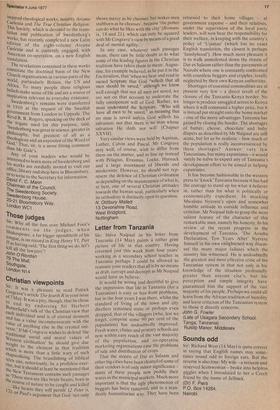Christian viewpoints
Sir: It was a pleasure to read Patrick Cosgrave's article The fourth R in your issue ?f 7 May. It was a pity, though, that he chose
end id by endorsing Sir Herbert
utterfield's talk of 'the Christian view that each individual soul is of eternal moment and has a value incommensurate with the value of anything else in the created uniI/te"e.' If Mr Cosgrave wishes to defend 'the Saditional social and moral values of Alestern civilisation' he should give due Weight to the element in that tradition Which is more than a little wary of such raPsodising. The brandishing of biblical texts can, notoriously, be a profitless exereise, but it should at least be mentioned that the New Testament contains such passages as 'These men are like brute beasts, born in "le course of nature to be caught and killed like beasts they will perish' (2 Peter ii, 4), or Paul's argument that God 'not only
shows mercy as he chooses, but makes men stubborn as he chooses', because 'the potter can do what he likes with the clay' (Romans ix, 18 and 21), which can only be squared with Mr Cosgrave's view by means of a good deal of mental agility. In any case, whatever such passages mean, there can be little doubt as to what some of the leading figures in the Christian tradition have taken them to mean. Augustine, for example believed, as he put it in the Enchiridion, that 'when we hear and read in sacred Scripture that God "willeth that all men should be saved," although we know well enough that not all men are saved, we are not on that account to underrate the fully omnipotent will of God. Rather, we must understand the Scripture, "Who will have all men to be saved, as meaning that no man is saved unless God willeth his salvation: not that there is no man whose salvation He doth not will' (Chapter XXVII). Very similar views were held by Aquinas, Luther, Calvin and Pascal. Mr Cosgrave may well, of course, wish to differ from them on the matter, and to line up instead with Pelagius, Erasmus, Locke, Harnack and a large assortment of liberals and modernists. However, he should not represent the defence of Christian civilisation as depending on the maintenance of what is, at best, one of several Christian attitudes towards the human soul, particularly when its orthodoxy is distinctly open to question. N. Oldbury Mallett 13 Devonshire Road, West Bridgford, Nottingham


































 Previous page
Previous page